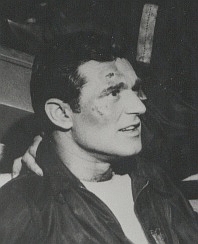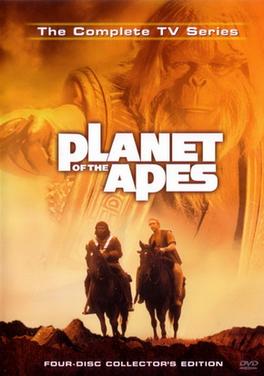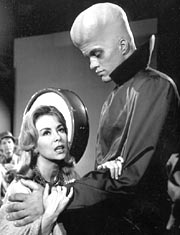
The Twilight Zone is an American media franchise based on the anthology television series created by Rod Serling in which characters find themselves dealing with often disturbing or unusual events, an experience described as entering "the Twilight Zone". The episodes are in various genres, including fantasy, science fiction, absurdism, dystopian fiction, suspense, horror, supernatural drama, black comedy, and psychological thriller, frequently concluding with a macabre or unexpected twist, and usually with a moral. A popular and critical success, it introduced many Americans to common science fiction and fantasy tropes. The first series, shot entirely in black-and-white, ran on CBS for five seasons from 1959 to 1964.

"Time Enough at Last" is the eighth episode of the American anthology series The Twilight Zone, first airing on November 20, 1959. The episode was adapted from a short story by Lynn Venable, which appeared in the January 1953 edition of If: Worlds of Science Fiction.
"Perchance to Dream" is the ninth episode of the American television anthology series The Twilight Zone. It originally aired on November 27, 1959, on CBS. The title of the episode and the Charles Beaumont short story that inspired it is taken from Hamlet's "To be, or not to be" speech.
"Elegy" is the twentieth episode of the American television anthology series The Twilight Zone. It originally aired on February 19, 1960, on CBS. The episode was based on a short story by Charles Beaumont published in the February 1953 issue of Imagination: Stories of Science and Fantasy.

"People Are Alike All Over" is episode 25 of the American television anthology series The Twilight Zone.
"Eye of the Beholder" is episode 42 of the American television anthology series The Twilight Zone. It originally aired on November 11, 1960, on CBS.
"The Invaders" is episode 15 of season 2 of the American television anthology series The Twilight Zone. The episode, which originally aired January 27, 1961, starred Agnes Moorehead. It was written by Richard Matheson, directed by Douglas Heyes, and scored by Jerry Goldsmith. Distinctive features of this episode include a near-solo performance by one character, and an almost complete lack of dialogue. The only dialogue in the entire episode aside from Rod Serling's usual narration came from Douglas Hayes, the episode's director. In addition, this is the only episode in which Rod Serling gives his opening monologue at the start of the prologue, rather than the end. The protagonist portrayed by Agnes Moorehead often cries out in pain and terror, but never speaks.
"The Rip Van Winkle Caper" is episode 60 of the American television anthology series The Twilight Zone, and is the 24th episode of the second season. It originally aired on April 21, 1961 on CBS, and was written by series creator and showrunner Rod Serling, and was directed by Justus Addiss.
"It's a Good Life" is the eighth episode of the third season of the American television series The Twilight Zone, and the 73rd overall. It was written by series creator/showrunner Rod Serling, based on the 1953 short story "It's a Good Life" by Jerome Bixby. The episode was directed by James Sheldon, and is considered by some, such as Time and TV Guide, to be one of the best episodes of the series. It originally aired on November 3, 1961. The episode was one of four from the original 1959 series which formed the basis of the 1983 film Twilight Zone: The Movie.
"The Midnight Sun" is episode 75 of the American television anthology series The Twilight Zone, first shown in November, 1961.

Drexel Jerome Lewis Bixby was an American short story writer and scriptwriter. He wrote the 1953 story "It's a Good Life", which was included in The Science Fiction Hall of Fame. It formed the basis of a 1961 episode of The Twilight Zone and was remade in Twilight Zone: The Movie (1983). He wrote four episodes for the Star Trek series: "Mirror, Mirror", "Day of the Dove", "Requiem for Methuselah", and "By Any Other Name". With Otto Klement, he co-wrote the story upon which the science fiction movie Fantastic Voyage (1966), the related television series, and the related Isaac Asimov novel were based. Bixby's final produced or published work so far was the screenplay for the 2007 science fiction film The Man from Earth.

The Twilight Zone is an American fantasy science fiction horror anthology television series created and presented by Rod Serling, which ran for five seasons on CBS from October 2, 1959, to June 19, 1964. Each episode presents a standalone story in which characters find themselves dealing with often disturbing or unusual events, an experience described as entering "the Twilight Zone", often with a surprise ending and a moral. Although often considered predominantly science-fiction, the show's paranormal and Kafkaesque events leaned the show much closer to fantasy and horror. The phrase "twilight zone" has entered the vernacular, used to describe surreal experiences.

Planet of the Apes is a 1974 American science fiction television series that was broadcast on CBS. The series features Roddy McDowall, Ron Harper, James Naughton, and Mark Lenard. It is based on the 1968 film of the same name and its sequels, which were, in turn, based on the 1963 novel Planet of the Apes by Pierre Boulle.

Lloyd Wolfe Bochner was a Canadian actor. He appeared in many Canadian and Hollywood productions between the 1950s and 1990s, including the films Point Blank (1967), The Detective (1968), The Young Runaways (1968), Ulzana's Raid (1972) and Satan's School for Girls (1973), and the television prime time soap opera Dynasty (1981–82). Bochner also voiced Mayor Hamilton Hill in Batman: The Animated Series (1992–95) and its follow-up The New Batman Adventures (1997–99).
"The Little People" is episode 93 of the American television anthology series The Twilight Zone. It originally aired on March 30, 1962 on CBS.
"A Quality of Mercy" is episode 80 of the American television anthology series The Twilight Zone, which originally aired on December 29, 1961. The title is taken from a notable speech in William Shakespeare's The Merchant of Venice, quoted in Serling's closing narration at the end of the episode.

"To Serve Man" is a science fiction short story by American writer Damon Knight. It first appeared in the November 1950 issue of Galaxy Science Fiction and has been reprinted a number of times, including in Frontiers in Space (1955), Far Out (1961), and The Best of Damon Knight (1976).
"Miniature" is episode 110 of the American television anthology series The Twilight Zone. It originally aired on February 21, 1963 on CBS. The story centers on a man's obsession with a dollhouse whose figures seem to be alive.

Joseph Ruskin was an American character actor.

The Outer Limits is an American television series that was broadcast on ABC from September 16, 1963, to January 16, 1965, at 7:30 PM Eastern Time on Mondays. It is often compared to The Twilight Zone, but with a greater emphasis on science fiction stories. It is an anthology of self-contained episodes, sometimes with plot twists at their ends.








